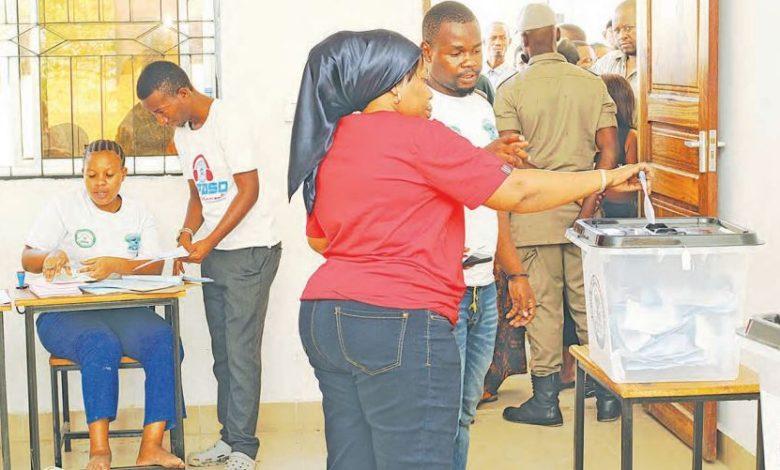Africa-Press – Tanzania. AS Tanzania edges closer to its October 2025 General Election, the role of religious leaders in promoting peace, justice and integrity in the democratic process is becoming increasingly vital.
Against the backdrop of political temperature and rising public engagement, clerics from various faiths are rising to the occasion, using their platforms to urge calm, ethical leadership and national unity.
In a country where religion plays an influential role in shaping societal values and political discourse, voices from the pulpit and the mosque have become essential in steering the nation toward peaceful elections.
Faith leaders are offering more than prayers, they are delivering pointed calls for civic responsibility and moral uprightness.
In many Tanzanian communities, particularly in rural areas, religious figures are among the most respected and accessible public voices. Their guidance carries weight, not because of legal authority, but because of spiritual trust.
In this way, they act as bridges between the state, civil society and ordinary citizens, helping to ensure that national values are upheld even amid political contestation.
The 2025 General Election will not just be a democratic milestone, it will be a moral test. This is a moment for the nation to show its character, to rise above division.
Tanzania has, over the years, built a reputation for political stability in a region often marred by unrest.
Much of this stability can be credited to the silent, consistent work of religious leaders who, through every electoral cycle, remind citizens of their shared identity and responsibility.
Their messages of peace, love and integrity cut across political lines, reminding Tanzanians that while parties may differ, the nation must remain united.
As the campaign season progresses, Tanzanians are being called upon to listen not only to the slogans on billboards or the speeches at rallies, but also to the deeper moral echoes coming from pulpits and minarets.
These voices, grounded in spiritual values and national ethics, are calling for a peaceful, corruption-free and fair election, an election that reflects the very soul of Tanzania.
Whether that vision becomes reality will depend not only on political leaders and electoral institutions, but on the everyday decisions of citizens across the country.
The choice to vote responsibly, to reject corruption, to respect others’ opinions and to act with civility lies in the hands of each individual.
Recently, prominent religious leader Prophet GeoDavie of Ngurumo ya Upako Church emphasised the vital role of elders’ wisdom in safeguarding national peace, especially as the country prepares for the 2025 General Election.
Prophet GeoDavie made the remarks during a reconciliation forum organised by the Tanzania Peace and Reconciliation Community (Jumuiya ya Maridhiano ya Amani Tanzania), held in Dodoma on July 8, 2025.
The forum brought together Muslim and Christian leaders from across the country to deliberate on efforts to preserve peace and stability in the lead-up to the highly anticipated election season.
“Elders’ wisdom should not be wasted. We respectfully ask President Samia Suluhu Hassan to allow us, as a Peace and Reconciliation team, to visit campaign zones once candidates have been confirmed. Our goal is to maintain love, unity and peace across the nation,” said Prophet GeoDavie.
The Tanzania Peace and Reconciliation Community comprises senior religious figures from both Islamic and Christian faiths, with a core mission to promote national unity and resolve religious, political and social conflicts.
Speaking at the same event, Chairman of Sheikhs and Bishops, Dr Sheikh Alhaji Mussa Salim, reiterated the organisation’s unwavering commitment to fostering peace and harmony without discrimination based on religion, culture, race, or political ideology.
“Our mission is to uphold peace and tranquility among Tanzanians regardless of their faith or background. We also seek to mediate and bring lasting solutions to issues that create division in our country,” said Dr Sheikh Mussa.
The religious leaders pledged to continue working together to maintain national cohesion and called upon all citizens, political actors and institutions to prioritise peace and dialogue as the nation approaches the general elections.
In March this year, during a service to inaugurate the new church building of the Kirua Parish in the Eastern Kilimanjaro Diocese, Bishop Dr Fredrick Shoo of the Evangelical Lutheran Church in Tanzania (ELCT) Northern Diocese made a resounding appeal for peace and justice during the electoral season.
Addressing worshipers, Bishop Shoo highlighted the October 2025 election which will include the selection of councilors, members of parliament and the president, as a critical moment for national unity and democratic participation.
He urged Tanzanians to approach the elections with dignity, encouraging every eligible citizen to come out in large numbers and vote peacefully.
Bishop Shoo’s message centred on the moral duty of citizens to participate actively in the election process, without fear, intimidation, or manipulation.
He emphasised the need to respect differing political opinions and to allow space for open, non-violent dialogue.
His call to action goes beyond the religious faithful, resonating with all Tanzanians who believe in the strength of democracy and the importance of peaceful political transitions.
This message aligns with the church’s broader mission of being a moral compass for society, especially during times when public discourse can be easily inflamed by partisan rhetoric. The Muslim community, too, is playing a pivotal role in this national moment.
In his Idd El Adha message delivered through the National Muslim Council of Tanzania (BAKWATA), Tanzania’s Mufti and Chief Sheikh Abubakar Zubeir called for unity, cooperation and love among all citizens.
He reminded the faithful of the importance of collective prayers and spiritual solidarity during this crucial period, urging all Muslims to pray for a peaceful election process and stable leadership.
Meanwhile, speaking at the Mohamed VI Mosque in Dar es Salaam, Sheikh Ally Hamis Ngeruko, cautioned against supporting individuals who use derogatory language or incite division, stating that such behaviour was contrary to the values of national unity and responsible leadership.
Sheikh Ngeruko lamented the growing influence of toxic discourse, particularly on social media, saying that it reflects deeper social challenges and the need for more responsible public debate.
His remarks underscore a concern shared by many citizens: that the rise of online misinformation, personal attacks and hate speech could inflame tensions and erode trust in the electoral process.
The call from the mosque, therefore, is one that urges citizens to be both prayerful and discerning, to reject emotional manipulation and to vote with wisdom and foresight.
Beyond spiritual appeals for peace and integrity, religious leaders are now actively being brought into national efforts to combat corruption a persistent threat to credible elections.
In Morogoro Region, the Prevention and Combating of Corruption Bureau (PCCB) recently organised a training session for faith leaders from various denominations.
The session was part of a broader public education campaign aimed at curbing votebuying, bribery and other illicit practices that can skew electoral outcomes.
In the training, Morogoro Regional PCCB Chief Pilly Mwakasege urged clerics to use their sermons and religious gatherings to educate the public on the moral and legal consequences of corruption.
She emphasised that religious institutions, given their deep reach into communities, are uniquely placed to lead this conversation and to inspire a culture of accountability and justice.
Her appeal resonated with many of the participants, who acknowledged that corruption is not just a legal offence but a moral failing that threatens the nation’s fabric.
Bishop Jacob Paulo Ole Mameo of the ELCT Morogoro Diocese echoed this sentiment, stressing that Tanzanians have a duty to pray for their country and to stand against corruption in all its forms.
He noted that identifying and reporting corrupt practices was not only a civic responsibility but also a religious obligation. Corruption, he said, is both a sin before God and a crime against society.
By encouraging congregants to expose wrongdoing, faith leaders can help dismantle the culture of silence and complicity that often enables corrupt networks to thrive.
Adding to this call, Morogoro Regional Sheikh Twaha Kilango urged fellow religious leaders to consistently address the issue of corruption in their teachings, especially as the election season intensifies.
He pledged that mosques in the region would continue to highlight this theme in their Friday sermons and other religious activities, urging believers to resist the temptation of bribery and to report any suspected cases of electoral malpractice.
The coordination between religious leaders and anti-corruption authorities reflects a growing recognition that sustainable peace and credible elections require not only political will but also moral leadership.
In the end, the lasting legacy of the 2025 election may not be who wins office, but how Tanzanians conduct themselves in choosing their leaders. And in that effort, the country’s religious leaders will have played a central, guiding role.
Tanzania has been named the most peaceful country in the East African Community (EAC), according to the newly released Global Peace Index (GPI) 2025 report.
The report, published recently by the Institute for Economics and Peace (IEP), ranks Tanzania 73rd out of 163 countries globally in terms of peacefulness.
The GPI assesses peace based on three core pillars: Societal safety and security, the extent of ongoing domestic and international conflict and the degree of militarisation.
In the Sub-Saharan Africa region, which includes 44 countries, Tanzania ranked 12th. The countries ahead of Tanzania in the regional rankings include Mauritius, Botswana, Namibia, The Gambia, Sierra Leone, Madagascar, Ghana, Zambia, Senegal, Liberia and Malawi.
Mauritius retained its title as the most peaceful country in SubSaharan Africa for the 18th consecutive year.
In contrast, the DRC was ranked as both the least peaceful country in the region and the one with the largest deterioration in peace.
According to the 2025 Global Peace Index, the world is considerably less peaceful now than in 2008. The average level of peacefulness has declined by 5.4 per cent over that period.
“Since 2008, some 94 countries have become less peaceful, compared to only 66 that have improved,” the report noted.
For More News And Analysis About Tanzania Follow Africa-Press







